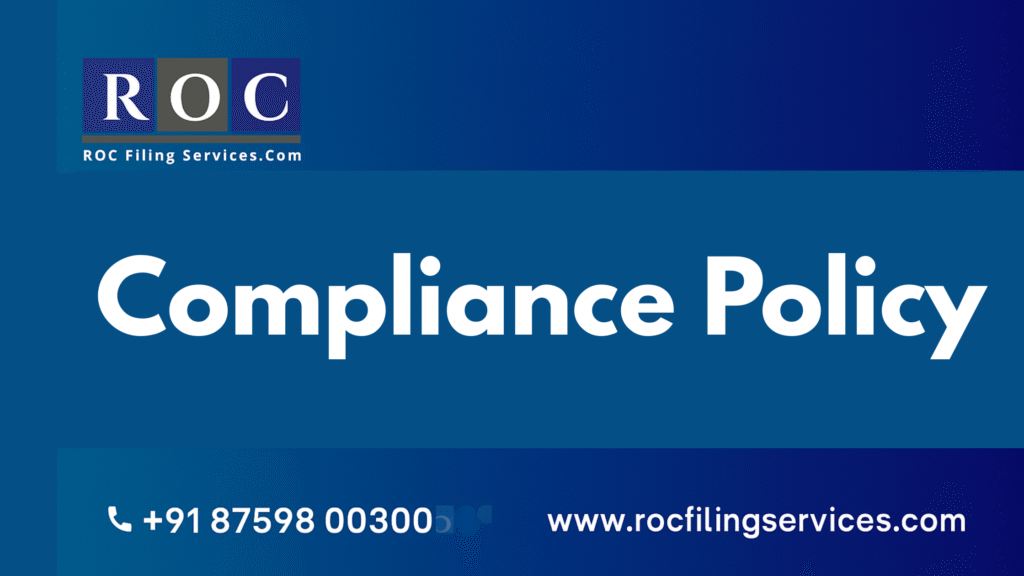ROC Filing Services
Compliance Policy: Importance
A compliance policy guides businesses to follow laws and ethics while protecting reputation. It reduces risks, builds trust, and supports growth.

1. Introduction to Compliance Policy
A compliance policy is a set of rules that guides how a business should operate within the legal and ethical framework. It ensures that every action taken by the company follows the law, respects regulations, and meets industry standards. Having a compliance policy builds trust with customers, employees, and authorities because it shows that the organization works responsibly. In today’s business world, where regulations are strict and penalties are high, a compliance policy is not optional but a necessity. It also helps protect the company from legal issues and reputational risks, making it a key part of business governance.
2. Objectives of a Compliance Policy
The main purpose of a compliance policy is to make sure the organization functions within legal and ethical boundaries. It protects businesses from penalties, lawsuits, and loss of reputation. A strong policy also ensures fair practices across departments, creating consistency in decision-making. Another important objective is to safeguard stakeholders, including employees, customers, and investors, by ensuring transparency and accountability. By following a structured compliance approach, companies also improve efficiency and reduce risks. Overall, the policy acts as a foundation for sustainable growth by balancing business goals with ethical and legal responsibilities.
3. Key Elements of an Effective Compliance Policy
An effective compliance policy must be clear, practical, and easy to implement. It should define the scope of compliance, list applicable laws and regulations, and explain the consequences of violations. Roles and responsibilities of employees and management should be clearly stated to avoid confusion. Regular training and awareness programs should also be part of the policy to keep everyone updated. Internal monitoring and reporting systems are another vital element to ensure continuous adherence. When these elements are well-structured, the compliance policy becomes a strong shield against risks and helps maintain a culture of integrity in the organization.
4. Types of Compliance Policies in Business
Compliance policies vary depending on the industry and business structure. Corporate compliance policies cover company-wide rules related to governance, ethical conduct, and employee behavior. Regulatory compliance policies are designed to meet government and industry-specific requirements, such as taxation, safety standards, and labor laws. Financial compliance ensures accurate reporting and prevents fraud. Data compliance policies safeguard personal and customer information. Each type of policy plays a different role, but together they create a strong framework that ensures the business operates legally and responsibly. Choosing the right mix of compliance policies helps organizations stay secure and competitive.
5. Regulatory Framework Governing Compliance
Every business must follow rules laid down by regulators. In India, companies follow laws like the Companies Act, Income Tax Act, GST regulations, labor laws, and environmental norms. Globally, businesses may also align with international standards such as ISO, GDPR, or industry-specific frameworks. A compliance policy ensures that the organization is always updated with these laws and avoids penalties. Regular audits and reviews are part of this framework, ensuring that businesses are consistent with changing legal requirements. A well-drafted compliance policy not only covers existing rules but also prepares for future regulations that may affect operations.
6. Role of Compliance Officers and Teams
Compliance officers and dedicated teams play a crucial role in enforcing compliance policies. They monitor activities, check whether rules are being followed, and take corrective action if issues arise. Their responsibilities include designing compliance frameworks, conducting training sessions, and reporting violations to higher management. In larger organizations, compliance teams work closely with legal and audit departments to create a strong system of checks and balances. A skilled compliance officer also anticipates risks and updates policies regularly. Their work is essential to ensure that the company’s compliance policy is not just a document but a practical tool in daily operations.
7. Compliance Policy for Employees
Employees are at the heart of a compliance policy. They need to understand workplace ethics, confidentiality rules, and codes of conduct. A compliance policy helps guide employees in handling customer data, following safety standards, and avoiding conflicts of interest. Companies must conduct regular training sessions to make employees aware of these responsibilities. Employees should also know how to report unethical or unlawful behavior without fear of retaliation. By clearly defining expectations, a compliance policy creates a positive workplace culture where accountability and trust are encouraged. This reduces risks while improving employee engagement and company reputation.
8. Data Protection and Privacy in Compliance Policy
With the rise of digital transactions, data protection has become a major part of compliance. Policies must cover how personal, financial, and business data is collected, stored, and shared. In India, businesses must comply with the Information Technology Act and data privacy rules, while international businesses must also consider GDPR and other global standards. A strong data compliance policy helps prevent breaches, cyber fraud, and misuse of information. It also builds trust among customers who expect their information to be handled responsibly. Data protection is no longer just a legal requirement but a business advantage in a digital-first world.
9. Compliance Policy in Risk Management
Risk management and compliance go hand in hand. A compliance policy helps identify potential risks such as financial fraud, data leaks, regulatory penalties, or operational disruptions. It sets preventive measures like internal audits, employee training, and whistleblower systems. By creating a structured risk management approach, businesses can act quickly when problems arise. Compliance also ensures transparency in decision-making, reducing the chances of misconduct. This proactive approach saves businesses from costly mistakes and helps maintain stability. Ultimately, a compliance policy acts as a safety net, ensuring that risks are not only managed but also minimized for long-term success.
10. Challenges in Implementing Compliance Policy
While compliance policies are essential, implementing them is not always easy. One common challenge is employee resistance, as staff may see compliance as extra work. Another challenge is keeping up with frequent changes in laws and regulations, which requires continuous updates. Smaller businesses may face cost and resource limitations in setting up compliance frameworks. Lack of awareness or training also creates gaps in policy enforcement. To overcome these challenges, businesses need strong leadership support, regular training programs, and automated compliance tools. When these hurdles are addressed, compliance becomes part of the company culture rather than a burden.
11. Best Practices for Drafting a Compliance Policy
Drafting a compliance policy requires clarity, structure, and adaptability. The language should be simple and easy to understand so that employees at all levels can follow it. The policy should cover scope, objectives, roles, reporting procedures, and disciplinary measures. Regular reviews and updates are crucial to keep the policy aligned with new regulations. Training programs, compliance checklists, and feedback systems help ensure proper implementation. Another best practice is involving employees in policy discussions to create ownership and acceptance. A well-drafted compliance policy not only ensures adherence to laws but also builds a culture of responsibility within the company.
12. Conclusion: Importance of a Strong Compliance Policy
A compliance policy is more than just a set of rules—it is the foundation of ethical and legal business practices. It protects the organization from risks, ensures transparency, and strengthens trust with stakeholders. By addressing laws, regulations, employee conduct, and data protection, a compliance policy creates a safe and sustainable business environment. Companies that invest in strong compliance practices are better prepared to handle challenges and grow responsibly. In the long run, compliance not only avoids penalties but also becomes a tool for building credibility, stability, and long-term success in any industry.
